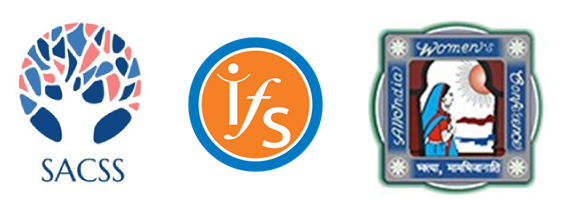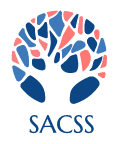Bolstering the Front Line:
Grassroots Organizations’ Role in Women’s Economic Empowerment
On March 13, as part of the ongoing 2024 UN CSW 68 (Commission on Status of Women) the All India Women’s Conference (AIWC), the NGO Committee on Human Rights, NY and the International Federation of Settlements and Neighborhood Centers (IFS) & SACSS, hosted a webinar titled, “Bolstering the Front Line: Grassroots Organizations’ Role in Women’s Economic Empowerment.
Kalyani Raj, AIWC president, Dr. Roberta Nassar, chair of NGO Committee on Human Rights NY and representative to the UN (IFS) and Sudha Acharya, SACSS executive director, who is also the principal AIWC representative to the United Nations, spoke at this parallel session which was moderated by Dr. Manju Kak, secretary general of the AIWC.
Other panelists included: Dr. Medha Puran Samant, chairperson and managing director of Annapurna Pariwar; Ela Gandhi, chairperson of Phoenix Settlement Trust and Gandhi Development Trust; Kuljit Kaur, member-in-charge of AIWC; Junias Kanyinda, communications officer at IFS; Mary Archana Fernandez, SACSS director of Family Support Services; and Nidhi Ashok Goel, founder and executive director of Rising Flame.
Navina Sitaram, representative of AIWC to the UN summarized the talk; Shevata Talwar, joint secretary of AIWC introduced the speakers; and vote of thanks by Dr. Upasana Singh, treasurer of AIWC.
The event brought together women leaders of global organizations that have come forward to empower the marginalized and vulnerable women to rid the feminization of poverty, a trend of increasing inequality in living standards between men and women due to the widening gender gap in poverty.
Each speaker noted the various aspects of what contributes to women’s economic empowerment and explored the best practices and programs at the grassroots level, which focused on access to healthcare and childcare, education, collaboration through social networking, financial literacy, and independence.
According to the panelists, women worldwide are the poorest of the poor. They are less likely to participate in the paid labor market, are more likely to be unemployed, and are paid significantly less than men.
Dr. Medha emphasized the importance of providing healthcare for women and their families. According to Dr. Medha, 250,000 people are covered under Annapurna Pariwar’s health insurance program.
“We designed our need-based health insurance program 21 years ago because poor women were not dying of HIV/AIDS, a heart attack, or cancer, but of diarrhea, jaundice, and malaria. They were dying of minor diseases,” Dr. Medha said. “Through our health insurance program, we have given them financial assistance and health advice and connected them to hospitals.”
In her presentation of AIWC’s programs, Kuljit Kaur listed education as the key to economic empowerment and gender equality. Among its programs is AIWC’s Village Adoption Project, which empowers rural women.
“In a village where governance was traditionally with the male members, the women now empowered themselves and took charge,” Kaur said. “They started directly selling the product in the market. The project helped achieve economic empowerment, education, health, and gender equality.”
Ela Gandhi referenced statistics that show a gap in the number of unemployed women and men in South Africa, which may be misleading due to the unequal salary scale for women in the country.
“The reality is that women continue to occupy jobs at the lower level and earn much less, and men earn much more. The lower level of jobs would be domestic work, cleaners, caregivers, and administrative staff. That is where you find the bulk of women. Even in universities, very few women hold leadership positions,” Gandhi said.
As working women take on the responsibilities of household chores and childcare, also known as the “double shift” according to Gandhi, this results in women often reluctant to take on leadership roles and facing discrimination in the workplace.
“A society that is keen to change the status quo will start from early childhood changing the perceptions and mindsets about the differential roles and create the understanding that all work should be shared. Society has created them and can discard them,” Gandhi said.
Nidhi Ashok Goyal, founder and executive director of Rising Flame, an organization based in India that advocates for women and youth with disabilities, discussed the stigma and shame of having a disability.
“Very often, surveys tell us that this girl or woman with a disability is placed below a non-disabled woman, below a non-disabled man of course, but also below the man with a disability, thus sitting at the bottom of the social structure,” Goyal said.
Goyal shared the organization’s first-ever research project on the impact of COVID-19 on women and girls with disabilities. According to Goyal, non-disabled kids were prioritized over disabled kids, and the disabled boy was prioritized over the disabled girl when it came to education.
Junias Kanyinda, a mother of three and an advocate for women’s and girls’ educational rights, shared her inspirational story of how community-based organizations supported her journey towards empowerment after immigrating to Finland from the Democratic Republic of Congo in Africa.
“I accessed further education and professional development through the Finnish Federation breaking through barriers that once seemed insurmountable,” Kanyinda said.
“Their inclusive policies and support for immigrant women like me allowed me to not only thrive but to also give back to the community that embraced me.”
Regarding women’s empowerment, Mary Archana Fernandez highlighted how SACSS’ sewing class gives immigrant South Asian women the skills, resources, and confidence to launch their own at-home business.
“It’s not just giving them a sewing machine and teaching them the skills but making them believe in themselves so that they feel empowered. “It’s giving them that self-belief and self-worth because a lot of them may have been told that ‘you can’t do this,’” Archana Fernandez said.
She also discussed SACSS’ Wednesdays for Women program, which focuses primarily on women’s health and well-being.
SACSS thanks AIWC, IFS, and the NGO Committee on Human Rights NY for their partnership in hosting this informative event. The speakers’ insight and dedication to uplifting women will help break down barriers and build a more inclusive and equitable society.


